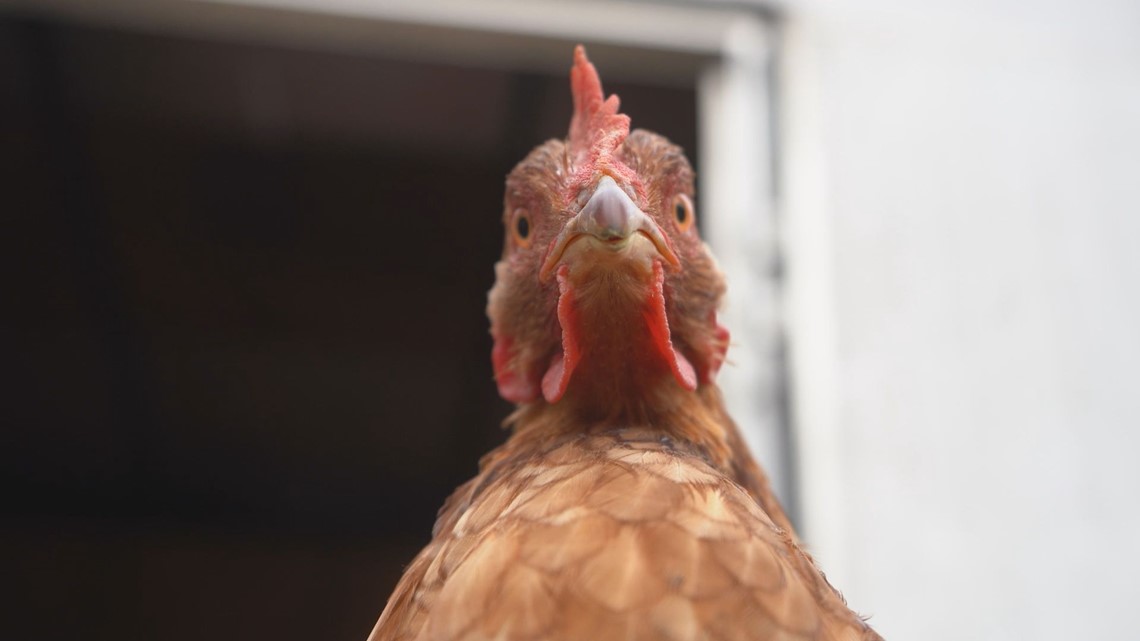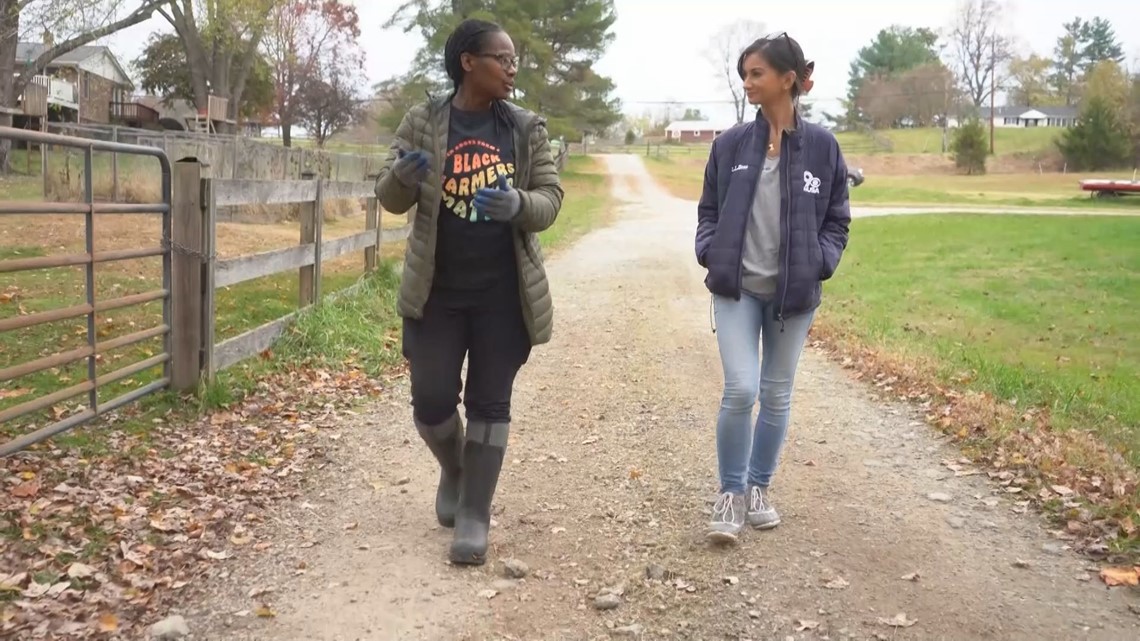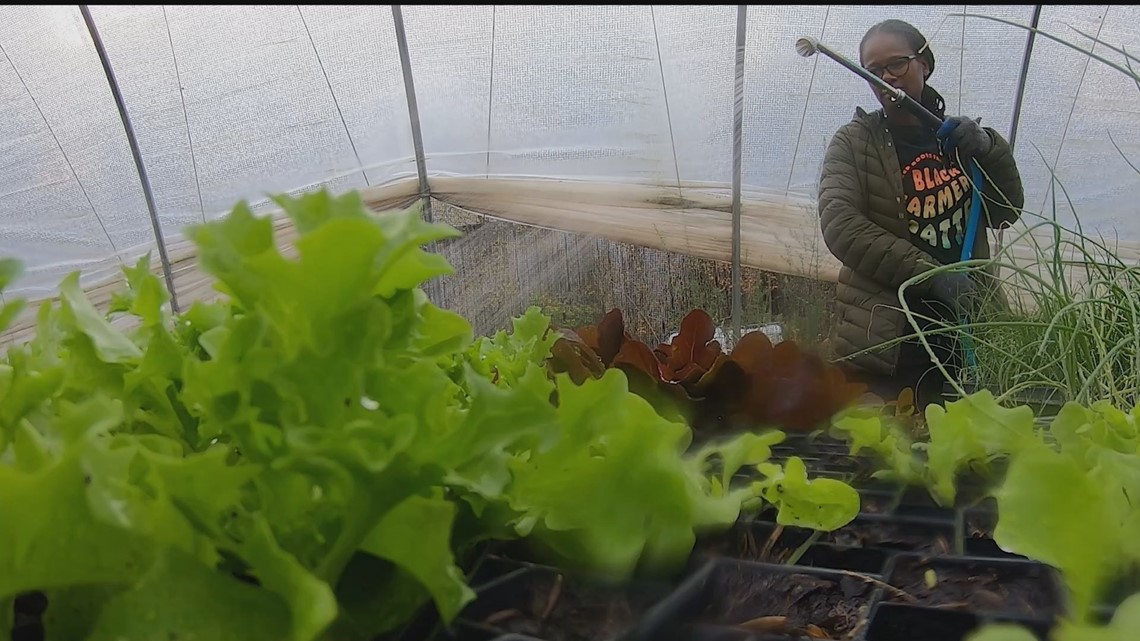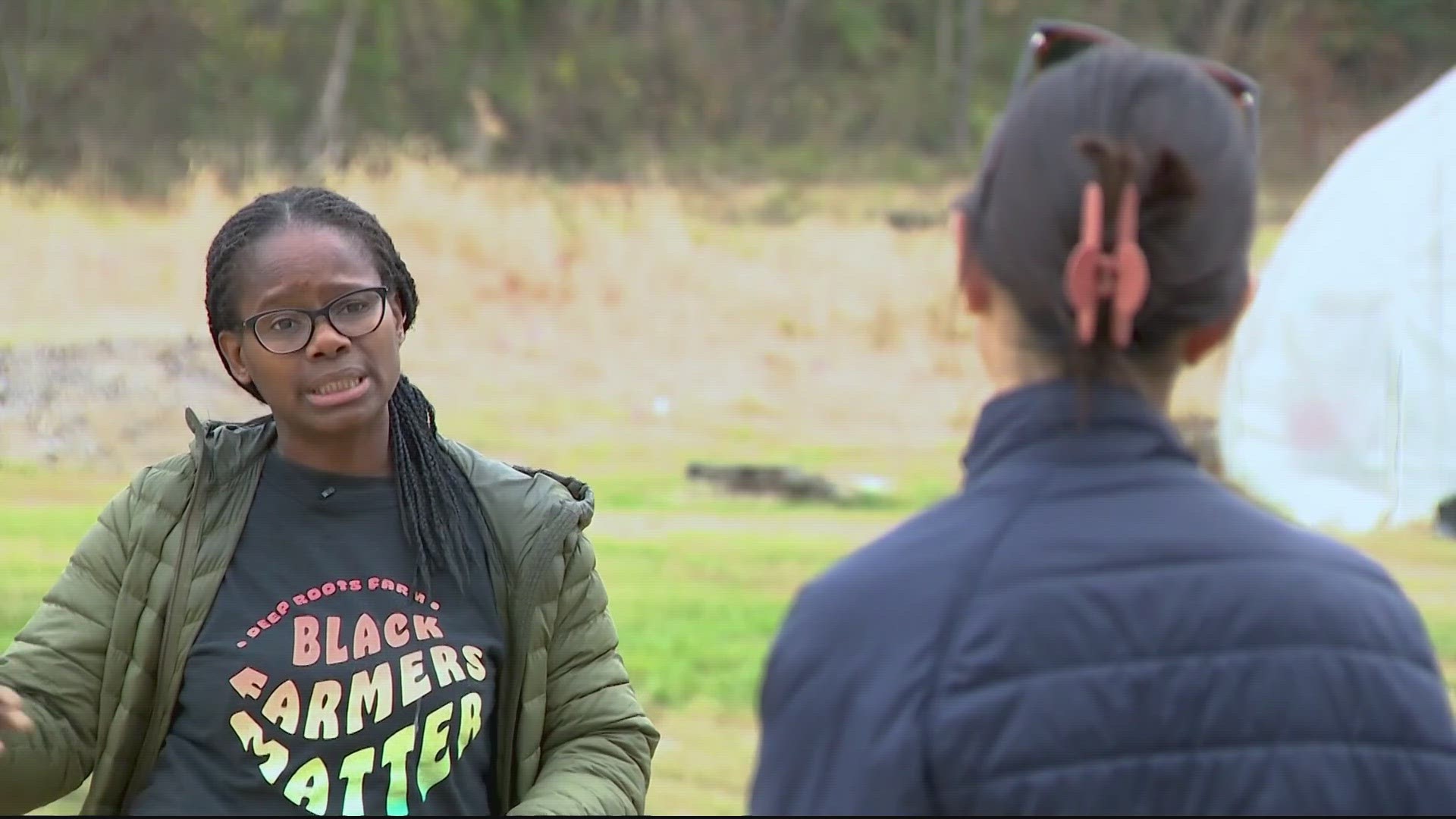UPPER MARLBORO, Md. — A 50-plus acre plot of land in Upper Marlboro — a former tobacco farm carved away for residential property, commuting-distance from D.C., without a single usable structure, running water, or electricity connection — turned out to be the perfect place for the renaissance of Gale Livingstone.
“Most folks call me Farmer Gale,” she says. “I eat well, I work hard and I do my best and just try to be a decent human being.”
She’s the owner, founder, and sometimes sole-employee of Deep Roots Farm.
“We are a diversified organic vegetable operation, so we grow the gamut of vegetables. Everything you can think about, we're going to grow,” she said.
But her plans for Deep Roots reach down into the soil—and out into her community.
“The coming together and the working together as Black people is something that's historic and part of our tradition, and it gives me goosebumps when I think about what we can accomplish as a unit when we work together,” she explains. “I believe in what I’m doing, and I believe that it will bear fruit.”
In her 40s, she quit a white-collar job and became a first-generation farmer, now on a mission to feed others and nourish stronger relationships between people and the land where their food grows.


Here’s part of our conversation with Livingstone about how she navigated a complicated system to establish her farm, why she thinks it’s so important to get Black people exposed to agriculture, and her advice for people needing a change. (Conversation edited for length and clarity.)
You weren’t always “Farmer Gale.”
I am a first generation farmer. I am 51 in a few weeks and I started farming in 2010. Wow. Now what brought me to farming was a traumatic event that occurred in my life, a vehicular accident that led me to utilizing gardening as a form of treatment. That was my healing environment. And that was in Germantown, Maryland. You know, community gardening plots there. And it just grew from there. And sitting out there one day thinking to myself, 'wow, look at how much food I'm growing in this small 10-by-10 area. What could I do if I had more land?' And I began researching and calling folks and reading everything I could get my hands on.
Okay, I love houseplants—but I can’t imagine quitting it all and starting a nursery. You really went all in.
Yeah. You know, it takes a lot of nerve, I think, and a lot of courage. And I'm going to pat myself on the back because I think, you know, as women, we're taught to be modest and subdued about our achievements because we don't want to come across as being arrogant or being overly confident. But I got to give my self kudos for all that I have accomplished. I mean, this was a blank slate. There was nothing here when we started. And granted, it didn't work out the way I planned because of the pandemic. So all of my projected costs have now doubled and tripled in some instances. But I'm a believer in God. And I believe that I was placed in this position at this particular time for this reason. And sharing my knowledge, sharing my experience, sharing the road that I've traveled to get here, I think is what I'm supposed to be doing.


The name “Deep Roots” implies that you've been here a while, but you’re still very much establishing this land and this soil. Is “Deep Roots” more of a hope, or a promise?
Deep Roots is a promise to my community. It's a promise that this farm will always be here, even after I'm gone. We've established a foundation, the Deep Root Foundation, which is going to provide education and training to the next generation of farmers. And that old tobacco barn behind me? We're going to convert that into an education center. And no matter what happens, this land and this space will always be here to allow for an opportunity for other folks to come and learn and develop their skills. And so that's the definition of Deep Roots in my time.
How did you find this particular land?
So I was really looking for a smaller property. So this property is 53 and some acres. And it used to be part of a much larger lot that the families divided over the years and sold off. But this is the main part of that old tobacco operation. And so I was looking for a smaller property and we were just driving, looking, looking, looking. And then the realtor that I was working with saw this place and pointed it out to me and said, 'Take a look at it.' I mean, there was nothing here, absolutely nothing other than two old tobacco barns, one that had almost completely collapsed, the old tobacco stripping house. And there was no running water, no electricity. I mean, absolutely nothing, no livable structure, no functioning structures. And so my initial response was, 'oh, what a beautiful property, but it doesn't even have a roadway for you to drive on.' Yeah. So I passed on it initially, and that was in February of 2019. And then by the end of 2019, I was not finding anything else. So, let's go ahead and make an offer. And they accepted the offer and we began the process of financing through the USDA.
Tell me a little bit about that process with the USDA.
Well, you know, one of the things that I came to realize early on in farming was anything's possible, right? You have to be very optimistic as a farmer, I believe, because you have no real control over anything that you're doing from a day to day basis. You're really at the mercy of nature, weather and all sorts of unforeseeable events. So I figured, OK, this is what I have available from a financial standpoint. Can't get much land with that. So the USDA had programs targeting individuals like myself: women of color. And so I said, OK, I'm going to ask them for everything that I need and let them say no. I always believe, and I raised my daughter this way: it doesn't hurt to ask. The worst anyone can say or any situation can result in is a no, and 'no' never killed anyone. And we started the process. Of course, lo and behold, the process was under the previous administration, which they had changed it and made it so much more difficult, almost as if they had set it up to discourage you from pursuing the operation. It ended up taking almost nine months before we closed on this property.


You were pretty deep into the process as you were realizing how difficult it was going to be—what did it show you about how effective these programs really are?
If you're truly trying to get land into the hands of Black farmers and regrow that group, which has been severely diminished in this country, then you're going to want to expedite those applications every time they come across your desk, in my opinion. We know what the numbers look like in this country. Very minimal amount of Black farmers in the country right now. And it's because of a lot of the injustices that was perpetrated by the USDA and many of other local organizations. And so to me, if you want to correct those past wrongs, the minute you get an application in it that says "Black" as the ethnic group? That application needs to be expedited. It's not about discrimination. It's about balancing the playing field. You walk around even at the market on Sunday. Tell me how many Black farmers you see there, too.
Why do you think that it's important for Black women to farm?
Well, because it's in our DNA and because our ancestors were brought to this land for that primary function to cultivate the soil here. It's part of who we are. The past traumas of being ripped away from our native soils and being placed in this country to cultivate it. To me, that says these people are the subject matter experts on this. So why not have folks who are subject matter experts in a field working in that field?
You know, children that look like me have no real understanding of where their food comes from, or how they can grow their own food. And you don't necessarily have to have a farm to grow your own food. But having them learn about how to grow anything that they can consume to nourish themselves should be a priority. And having them learn that from individuals that look like them also can help to, you know, hopefully guide them into the agricultural field. Not that they all have to become farmers, but there are multiple components to agriculture that there's not enough diversity out there to occupy those positions. You know, there is soil science, there is plant science, there's animal science. There are all sorts of fields within the agricultural arena that you need more individuals of color. And having those young people exposed to people like myself on a production farm, I think can lead to a lot more of those individuals studying those fields and ending up in this work.
That would be a hard thing for some people to hear, and I imagine it has been something that could get some pushback. But it sounds like you're saying you see it as more of a healing process?
Healing and liberating. Right? Because I always tell folks as human beings, there's three things we need to survive: food, air, and water. Maybe shelter, but you can make shelter from anything. Food and knowing how to grow your own food to be able to sustain yourself, that is very liberating and empowering.
What was your day to day before you were a farmer?
Daily commuting from Germantown, Maryland, to Reston, Virginia, or to Crystal City. You know, wherever I was working on a contract for the federal government. That life was not very stimulating at all. It was not my happiest time. It definitely wasn't my healthiest time either. You know, dealing with that experience, and then having to sit in traffic twice a day is just really is what pushed me over. I was like, no, you can't do this anymore. You've got to make a change.
You know, I thought about it way back when I started, and I said, 'you know, I'm really tired of the work that I've been doing. What can I do that I will enjoy and make a living doing?' And I had been gardening prior to that and realized, you know, people are going to always need food. I'm never going to be out of work. I'll never be unemployed because as long as I know how--even if I just grow lettuce and onions, I will always be able to earn a living and sustain myself and my family. So, you know, it's one of those things where you really have to think about what is truly important to you. Over the past ten years, I've made a significant amount of sacrifices to be able to be in this position because this is not by any means an inexpensive endeavor. It takes its toll on your body. It takes a toll on you emotionally and mentally. There's a lot of stress that goes into it, especially when you're setting up an operation from nothing.
A lot of people can identify with that—what would you say to someone who is experiencing that need for change too?
As I step out on faith, you know, the worst that could happen is that you have to start over. And I always tell people, even though I am 51, even if I lost everything tomorrow, I would try again. I would not give up because what is the point of living if you don't have anything that motivates you, that excites you, that makes you feel alive? Right. I mean, that's what doing this work, that's for me, it's no matter how bad my knee hurts or my elbow hurts, I get out of that bed, I go in the back, I feed my chickens, I feed my dogs, I play with them, I love on them. And I get the day started. And even when I experienced about a month this season with almost zero employees as out here by myself, yeah, Many mornings I got up and I got on these knees and I prayed and I cried and I said, okay, Lord, you, you've got a plan. I'm going to keep muddling through because this is where you want me to be and things will fall into place. But I always tell folks, you know, you just cannot give up. You have to have faith.
I eat well, I work hard and I do my best and just try to be a decent human being.
Why is it so important to you to be close to the city and other communities?
Think back during the pandemic and our borders were shutting down, ports were shutting down, and the food couldn't come out of Central America into our country or out of the Middle East or wherever it was coming from anymore. Think back to who was feeding you and where that food was coming from. It's the farmers like myself and the folks that are just outside of D.C. that was trucking that food into DC to feed everyone. Right. So having local farms, and when I say local, I to me, local is within 100 miles of where you live. Now, everyone has their own definition of local, but, having sufficient smaller operations within close proximity to major cities can sustain cities all year long. We're in a zone seven, and so we grow year round here. We've got tunnels full of lettuce and onions and spinach and kale and all the greens back there, and those will grow all winter long. We will be harvesting off of those and taking it to market. And so supporting local farmers and farms like Deep Roots that are very close to the city, it's a no brainer to me. Even if just for self-preservation, then here's a great opportunity. Supporting local farms, making sure that you and your family can be fed. I'm not saying that you shouldn't buy produce from other places, but first and foremost, look for your local farms.
You grow a lot already, year-round, but have big plans for this land.
My goal is to be able to offer our members a full lifecycle CSA. If you are a non-meat eater, you get all your vegetables. We hope to have our bees set up next year, so we'll offer folks honey, we want to offer folks eggs. We also did meat birds last year where we raised chickens for meat. So we're going to have goats and sheep and cattle and pigs and we're going to have livestock. So if you are a meat eater and you want to get your pork from us, you can join our pork CSA or you can join our meat CSA and get all your different meats, right? We're going to do ducks and turkeys, but we also do agrotourism. So we do farm to table dinners, we do farm tours, we do education tours for the younger groups. You know, we do tours for beginning farmers. So any events that you're interested in having, if you want to have it in our space, in an outdoor space on a production farm, we're barely 40 minutes outside of D.C. We're here.
That’s an exhausting list just to think about. On hard days, what keeps you going?
I would have said what keeps me going is knowing that I have responsibilities to take care of my family. And that's what's always motivated me. I was a single mom, I raised my daughter by myself. You know, my mother is 71 now. She's usually here with me, helping out, doing something, cleaning or washing eggs or doing something. But knowing that she brought me to this country at the age of seven and gave up her home and everything that she knew so that I can have these opportunities and a better life. I had that responsibility to take care of her. You know, and I'm not angry about it. I mean, I love my mother and I would sacrifice anything to be able to take care of her. And so this is the way I'm going to do that.
What does it mean for you to be rooted in your community?
Being rooted in my community -- and when I say my community, I think of my community in layers: first and foremost as the community of the people that look like me. My Black community. The coming together and the working together as Black people is something that's historic and part of our tradition. And it gives me goosebumps when I think about what we can accomplish as a unit when we work together. And not to say that other cultures or other groups don't do it or can't do it. But for far too long, the black community has been so divided and not in the mindset of we can work together and we can all achieve.

